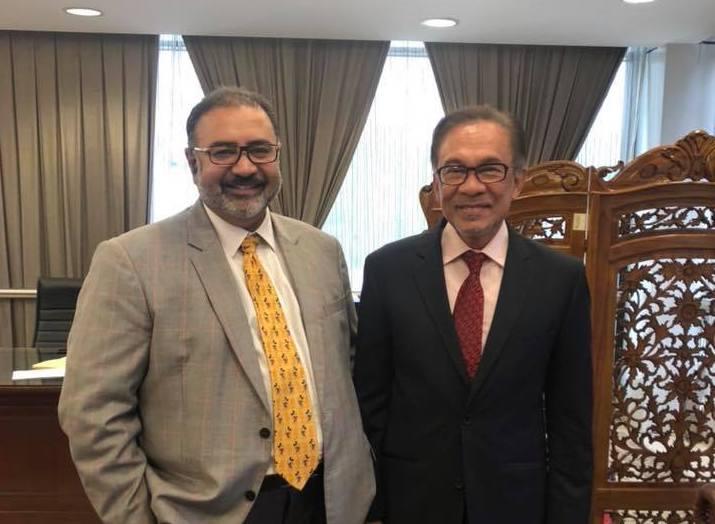Watchdog presses Hungary govt to reveal details of half-a-billion dollar contract to Malaysian businessman
Transparency International says it is prepared for a lengthy court process as it steps up its scrutiny of the controversial purchase of ventilators last year.
Just In
The Hungarian chapter of global anti-corruption watchdog Transparency International (TI-Hungary) is pressing Budapest to release specific details related to its purchase of more than half a billion dollars worth of medical equipment from a Malaysian tycoon last year.
TI-Hungary said there were questions on whether the contracts awarded to GR Technologies had fulfilled transparency regulations in Hungary.
GR Technologies is a company represented by Malaysian businessman Vinod Sekhar, a close friend of PKR president Anwar Ibrahim.
“Hungarian transparency requirements are in line with the EU’s transparency requirements enshrined in the anti-money laundering directive,” Miklos Legati, the head of TI-Hungary’s legal affairs division, told MalaysiaNow.
He said a freedom of information request had been submitted to the Hungarian foreign ministry, which signed the contract with GR Technologies.
The details sought include who was behind the selection of GR Technologies, details on the company’s credentials, invoices and proof of payments.
“We anticipate no due response from the ministry and prepare for a lengthy court process, but we’ll see how things unfold in the end,” Ligeti added.
A Hungarian investigative journalist recently made available copies of the contracts to MalaysiaNow. The documents were released to her by the foreign ministry last year.
In one of the documents, the Hungarian government agreed to pay a total of US$559,600,000, or about RM2.4 billion, to GR Technologies.
Third-party recipients
Legati said among concerns about the contract was the fact that Budapest agreed to pay the fees charged by GR Technologies to third parties, as well as whether the government had gone through a competitive bidding process.
“In this specific case it is unclear how the Hungarian government selected or recruited GR Technologies to supply respirators and other related goods,” he added.
Legati said of equal concern were third party recipients of payments made to two companies: China-linked Silk Road Development Fund Management Holding Ltd and Singapore-based Havelock International (Pte) Ltd.
He said EU transparency laws require that any payments to a third party should specify the reasons for doing so.
“Otherwise such transactions are against the requirements enshrined in Hungary’s act on state accounts, which expect the government and other public organs to clearly define the conditions and beneficiaries of payments,” he said.
Legati said there were also questions on whether GR Technologies had been duly authenticated to ensure that it meets transparency requirements.
“According to current Hungarian regulations, the government may only contract transparent organisations and state money may only be conferred upon or conceded to transparent organisations,” he said, referring to two laws passed by the current government of Hungary.
In June, MalaysiaNow reported that Vinod, who operates a chain of companies and organisations under the Petra Group, had secured the lion’s share of billions of dollars worth of contracts to supply ventilators to the Hungarian government.
Hungary’s purchase of ventilators from various suppliers kicked up a storm last year, with opposition politicians calling out the deals for being opaque as well as resulting in an oversupply.
Vinod recently confirmed the contract but insisted that “everything was above board”, adding that he had received a “normal percentage” in commissions.
“People gave their time and energy to secure it, and they should be paid,” he said in an interview with a news site. “Eventually, I’ll get the commission and I’ll make a donation to Hungary.”
A vocal Hungarian opposition MP, Vadai Agnes, had told MalaysiaNow that her call for an investigation into the purchases was dismissed by the prosecutor-general.
She said the ventilators purchased by the government were overpriced, giving the example of how it bought one ventilator unit for an average price of 19.8 million forints (RM270,000) when the National Healthcare Service Centre had paid an average 10.8 million forints (RM147,000) for a unit.
“And there is no explanation for such a price difference from the government,” Agnes said.
István Ujhelyi, another prominent Hungarian politician, meanwhile questioned why the purchases were made through the foreign affairs ministry.
“It is strange in itself that the procurement of health equipment is not handled by the government ministry responsible for healthcare, but by the foreign affairs department,” Ujhelyi had said in October last year.
Subscribe to our newsletter
To be updated with all the latest news and analyses daily.
